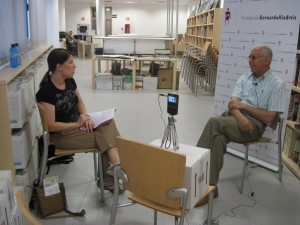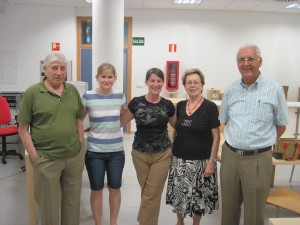I hardly know where to begin recounting the events of today. Little did we know that on June 7th we would be making our big journalistic debut! We have taken in so much in such a short amount of time it seems difficult to even find the words to describe the experience. We finally got a peaceful long night of sleep last night after having an early dinner at VIPS. We woke up this morning with the agenda of visiting the Fundacion Bernardo Alardon in Zaragoza. Prior to coming to Spain, I had been in contact with Julian who works at this foundation which works to preserve the historical memory of the many members of the UGT syndicate that were affected by the war and post war years.
Our meeting was set for 11 a.m. and when we arrived he informed us that he had contacted several people whose families had suffered greatly during the war and were willing to come and share their testimonials with us. We entered the library/archive area of the center where many materials, posters and pictures help educate those about the personal stories of UGT affiliated people during the war and post war years. Julian led us to the area he had set up for us. I felt like a professional journalist. He had set up chairs, a backdrop and had waters prepared for us. I also started to get nervous about how the interviews would go.
I didn’t have anything to worry about though as I was put at ease the second our first testimonial interview began. Eliseo was born in 1939 at the end of the war and suffered greatly as his parents were jailed through the beginning of the post war era. His father had been active in a labor union and was thus labeled as dangerous and subversive. He was a marked men and forced to enter prison and work camp until his sentence was finally commuted. His mother spent five years in prison for simply being married to his father. She was 18 years old when she was sentenced.
Eliseo was finally able to reunite with his family after many years but they fled their home province and moved to Zaragoza to start over under an assumed name. It wasn’t until the late 1950’s that his father was able to reclaim his birth name under a blanket amnesty act that pardoned those living under false identities. He conveyed to us the extreme poverty and misery that was Spain during the post war years. He said that his parents lived under a constant fear that they would be found out and never stayed long in one place.
Our second interview took place with Jose Benito who is a man born in 1939 with quite a story to tell. His father was Italian and thus named his son in honor of Benito Mussolini. His father arrived in Spain to fight with Franco’s nationalist forces and met his mother who was Spanish. He shared that he believed his father came to fight not because of idealogical reasons but because he was from a poor area of southern Italy and he was looking to escape. After the war, his father was sent to work for several years to Germany to help the war efforts there and eventually died in a work camp in Germany. The interesting story is that Jose himself has developed a very different worldview and considers himself an activist and champion of liberal causes. He has recently finished compiling a book of stories recounting the horrors suffered by members of the UGT Labor Union during the civil war.
Our final interviewee offered us a story of life as a child in war time exile. Natalia Polo Sanmartin is the daughter of two teachers who were killed at the beginning of the war for trying to spread so called subversive ideas through their classrooms. She has recently finished a book about the life of her parents and was kind enough to autograph a copy for us. Natalia and her siblings left with her aunt for summer vacation when she was just five years old. The plan was for her parents to join them but they never made it and it wasn’t until several years later that the truth about their death was discovered.
Natalia and her siblings found safe haven in France and lived at foster Spanish children colonies in Biarritz and Bayonna. These colonies educated and supported Spanish children that were exiled during the war. Due to France’s desire to avoid aggravating Hitler, the French government did little to support the efforts so each child had a sponsor that would send money, presents and letters to offer financial and emotional support. It was very obvious that Natalia had deep regard for the American couple from New York that sponsored her stay. She even told us that a boy living in the colony was supported by Mrs. Roosevelt so they were all paid a visit by the First Lady herself.
She described these years in France as quite happy compared to what she would have been suffering in war torn Spain. There was, however, a sudden change once France became occupied by the German forces during WWII. She told a moving story of two young Jewish girls in her elementary school class who failed to show up for school soon after the onset of the German occupation. She said that her teacher stopped class and asked for prayers for those two girls, since it was unlikely that they would ever be seen again. Soon after the decline in the safety of life in France, Natalia and her aunt and siblings returned to Spain to make a new life for themselves. Unfortunately, the suffering of the families of those fighting with the republicano band was not short lived. Natalia recounted to us numerous stories of subsequent years of suffering she and her family endured.
It was an honor and pleasure to meet these first hand witnesses to the post war era in Spain. They offered a unique perspective as they were innocent children robbed of their childhood due to events completely our of their control. An interesting close to our morning was a casual conversation that occurred as we were departing. They asked where we were headed next and we commented that we would be stopping at Valle de los Caidos which is a huge basilica where Franco is buried.
Upon hearing this, their reaction was utter disgust at the monument that to them symbolizes the death of so many republicano prisoners of war that were forced to work for years building this monstrosity that according to Franco stood to memorialize “los caidos por Dios y por Espana.” One even asked jokingly if we could take a bomb with us on our visit. It is obvious through conversations both insignificant and those more formal that Spain indeed still stands as a divided country in regards to how its history will be remembered.




What an incredible experience to interview these individuals. I have chills reading it. Great job. And your posts are so informative. Keep it up!
Oh my goodness, this is all so incredible, I wish I could be with you during these interviews… these people seem amazing.